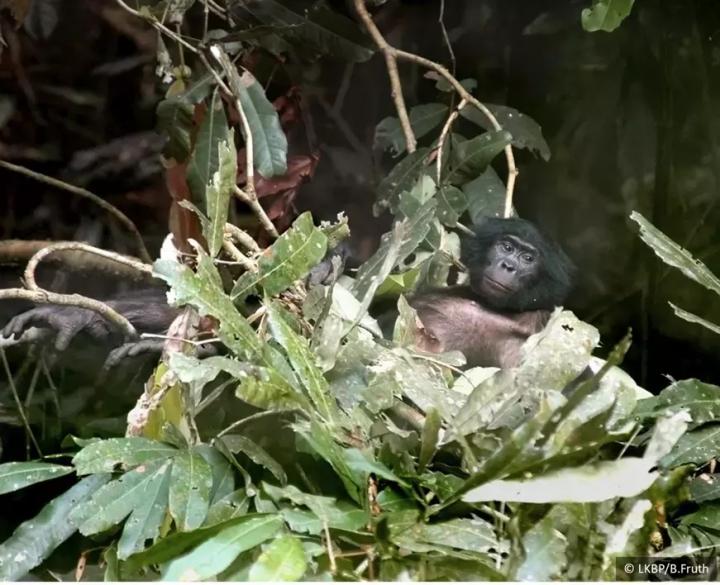Study warns that changing climate in the Congo Basin is impacting assessment of the endangered apes

Credit: MPI of Animal Behavior/ Barbara Fruth
There might be fewer bonobos left in the wild than we thought. For the last 40 years, scientists have estimated the abundance of endangered bonobos by counting the numbers of sleeping nests left by the apes in forests of the Congo Basin. Now, researchers from the Max Planck Institute of Animal Behavior report that the rate of sleeping nest “decay” has lengthened by 17 days over the last 15 years as a result of declining rainfall in the Congo Basin. The study warns that longer nest decay times have serious implications for ape conservation: failure to account for these changes would lead to overestimating population density by up to 60 percent, subsequently jeopardizing conservation of these endangered great apes in the wild.
Bonobos (Pan paniscus) are a species of great ape similar to chimpanzees that are found only in the rainforests of the Congo Basin–the second largest forest area of the planet and known as one of Earth’s “green lungs.”
The study of the LuiKotale Bonobo Project, which is part of an ongoing collaboration with scientists at Liverpool John Moores University, the Centre for Research and Conservation, and the Max Planck Institute of Animal Behavior, aimed to assess the influence of weather on the decomposition of bonobo sleeping platforms, also called nests. In the LuiKotale research site in the Democratic Republic of the Congo, the scientists studied 15 years of climate data, including rainfall, and 1,511 bonobo nests observed from construction to disappearance. “While climate change is known to be impacting Central African rainforests, a lack of real data from the Congo Basin meant that we didn’t know how this was affecting the region and bonobos,” says Barbara Fruth, Group Leader at the Max Planck Institute of Animal Behavior in Konstanz, Germany, who is senior author on the study. “Our study provides evidence that the world’s largest freshwater reservoir is suffering from climate change,” she says.
How to convert nest counts into ape counts
This troubling trend has added importance for bonobos, and great apes in general, because their populations are estimated not by counting actual apes, but rather the nests left by the primates each night. Knowing how fast these nests disappear is essential for converting nest counts to ape counts. The study’s results showed a steady decline of rainfall across years and the impact of this on bonobo nest decay times. Less rain meant that nests persisted for longer in the forest. Further, the scientists observed bonobos using more solid construction types in response to more unpredictable storms.
The connection between nest decay and climate change is relevant to conservation of all great apes because nest counts are used as the “gold standard for estimating their populations,” says first author Mattia Bessone, a PhD student at Liverpool John Moores University who is working on validating cutting-edge methods for assessing threatened species. “As climate change continues to affect both the process of nest decay and ape nest building behaviour, great ape nest decomposition times are likely only to increase further in future years. “We stress the absolute necessity to take into account the specific impact of climate on nests in areas where these are being used to surveying great apes. Failure to do so will invalidate biomonitoring estimates of global significance and subsequently jeopardize the conservation of great apes in the wild.”
###
Original publication
Mattia Bessone, Lambert Booto, Antonio R. Santos, Hjalmar S. Kühl, Barbara Fruth
No time to rest: how the effects of climate change on nest decay threaten the conservation of apes in the wild
PLOS ONE
Media Contact
Dr Barbara Fruth
[email protected]
Original Source
https:/
Related Journal Article
http://dx.




